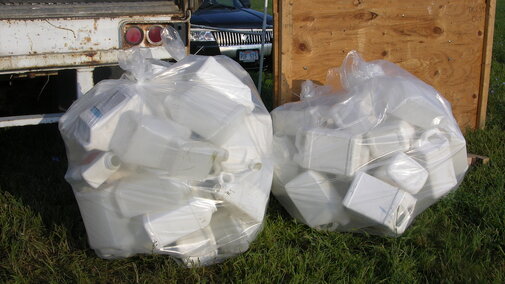Another growing season is upon us, and with it comes the widespread use of crop protection products. Pesticides are an important tool in agricultural pest management, but they must be handled with care, from purchase to disposal, in order to reap their benefits and minimize their risks. Nebraska’s private and custom pesticide applicators care deeply about the land and the resources it provides, and they understand their responsibility in protecting these things. This is one reason programs such as the Nebraska Pesticide Container Recycling Program have been so successful over the years.
According to the U.S. Geological Survey, tens of millions of pounds of pesticides are applied in Nebraska each year, a significant portion of which can be attributed to agriculture. That adds up to a lot of empty plastic containers. The Nebraska Pesticide Container Recycling Program, now in its 29th year, provides a way for private and commercial applicators to safely and responsibly dispose of their agricultural pesticide containers, free of charge.
The COVID-19 pandemic will likely affect the recycling program in 2020. Individual collection sites will have the final say on how they wish to operate. For the safety of their employees and those dropping off containers (recyclers), potential steps to take include:
- Requiring employees and/or recyclers to wear personal protective equipment such as facemasks and gloves;
- Marking physical boundaries to ensure social distance;
- Adjusting site availability (e.g., reducing from May-August to specific days or by appointment only).
Information on specific collection sites will be listed here: https://pested.unl.edu/recycling.
The program accepts only containers that held pesticides for crop, ornamental/turf, forestry, aquatic, and public health pest control, as well as crop oils, surfactants, and adjuvants. Containers that held consumer pesticides (e.g., home and garden products) are not accepted. (Some cities or counties offer household hazardous waste disposal events for these types of products.)
All collection sites in Nebraska accept 1- and 2.5-gallon plastic containers. In addition, some sites accept 15-, 30-, and 55-gallon plastic drums. Check the list of sites for details.
Collection site managers thoroughly inspect containers before accepting them for collection, so make sure you have prepared containers properly.
Before dropping them off at a collection site, you must triple- or pressure-rinse each container according to label directions. It is best to do this at the time of the application, as rinsate can be safely added to a tank load and used as spray. Delayed rinsing can result in dried residue in containers that is difficult to remove.
With the exception of materials that are glued to containers, remove and discard any labels, booklets, and slipcover plastic. Caps cannot be recycled; rinse all caps and discard them as regular trash.
The Agricultural Container and Recycling Council (ACRC), which oversees container recycling nationwide, is a not-for-profit organization funded by manufacturers and distributors of crop protection products. ACRC reports that 10.9 million pounds of plastic were collected nationally in 2019, putting the historical total at over 200 million pounds collected since 1992.
ACRC’s Midwest contractor, G. Phillips & Sons, collected 67,688 pounds in Nebraska in 2019. This is approximately 10% less than the 74,800 pounds collected in 2018.
Recycling is the most sustainable, environmentally friendly method of container disposal. The plastic from recycled containers is used to make industry-approved products such as pallets, drain tile, underground utility conduit, landscape edging, and nursery pots. Instead of adding them to a landfill, consider recycling your containers this year.

